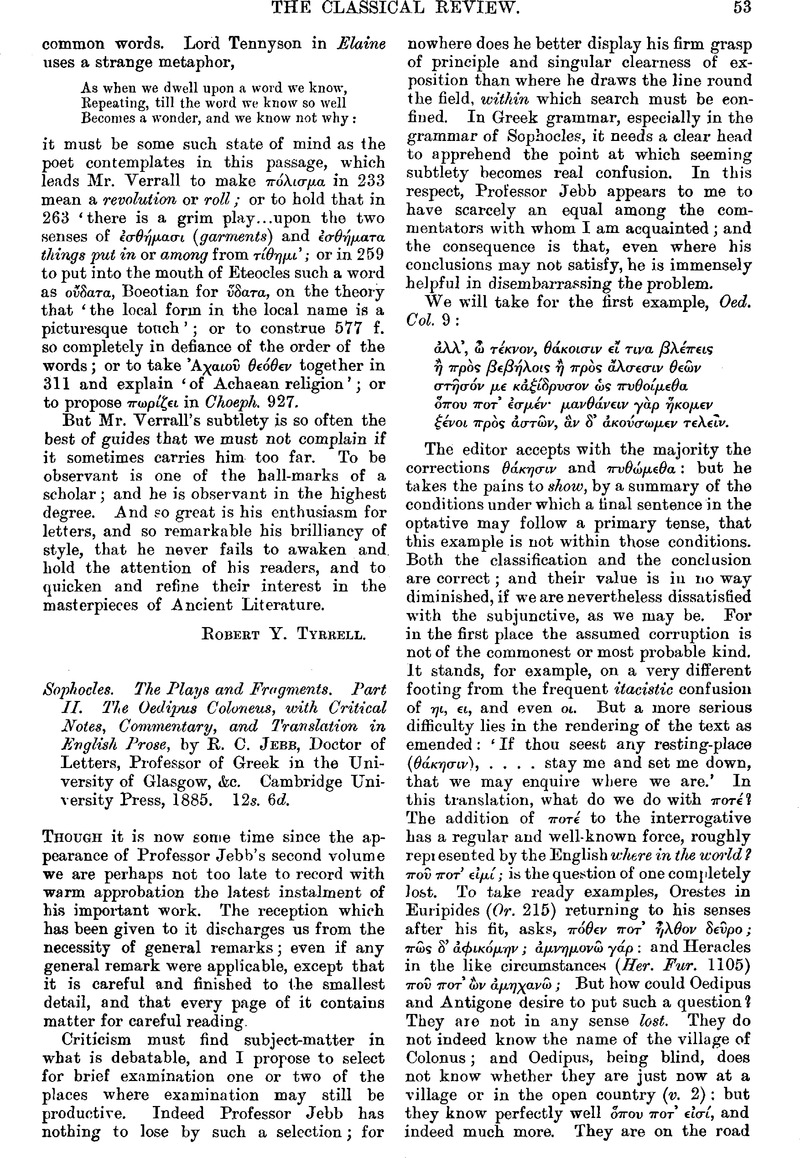No CrossRef data available.
Article contents
Sophocles. The Plays and Fragments. Part II. lite Oedipus Coloneus, with Critical Notes, Commentary, and Translation in English Prose, by R. C. Jebb, Doctor of Letters, Professor of Greek in the University of Glasgow, &c. Cambridge University Press, 1885. 12s. 6d.
Published online by Cambridge University Press: 27 October 2009
Abstract

- Type
- Reviews
- Information
- Copyright
- Copyright © The Classical Association 1887
References
page 54 note 1 I take the construction to be θκοισι, στσν με,εἴ τνα (θκον) βλπεις The passage from the plural to the singular is natural and even necessary. The difference between θɔς and θκοι (with singular meaning), where they differ, is that θκος is the material seat or thing sat upon, as a bench, or cliair, θκοι a sitting-place, a seat considered generally or in the abstract. Here therefore the plural and the singular are each correctly used; θκῳ στσον might have seemed to indicate a particular seat, and on the other hand εἴ τινας βλπεις (since with βλπεις the conception must be material) would have suggested a number of seats, which is not the intention. For the construction of the locative θκοισιν compare Oed. Tyr. 20 γοραῖσι θακεῖ : it seems here to be indispensable, if στσον is not to be otiose; στσν με could only mean ‘stop me’, which is surely the same thing as ‘let me rest’.
page 54 note 2 Enr.fr. 877,τηλο γρ οἴκων βοτον ξιδρυσυην, cited by the editor. He adds that there ‘it is the context which fixes this sense.’ This is true, and the passage certainly does not prove that ξιδρω could bear no other. But it strengthens the presumption which the form itself suggests, that this is the natural meaning of it.
page 54 note 3 Kuehner, Greek Grammar, § 567, 6, quoting Aesch. Eum. 696, Soph. Track. 94 κα γρ ὕστερον τ γ’ εὖ πρσσειν, πε πθοιτο, κρδος μπολᾷ and other examples.
page 55 note 1 The assumed corruption is not, however, very natural: ἔρωτες might well be changed to ἔρωτος, ‘and the change of τνδε to τοδε would follow’. Why so ? ἔρωτος τνdε is not obviously inexplicable, for τνδε might stand for με and a corrector, if we suppose deliberate change, would have devised something easier than ἔρωτος τοδε.


